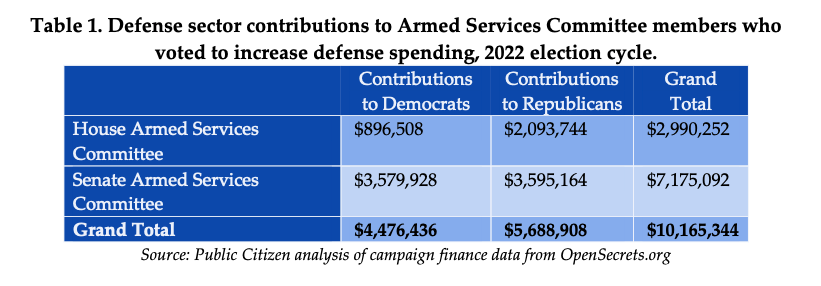“The military-industrial complex’s campaign spending spree gives war profiteers an outsized influence over Pentagon funding votes,” said a Public Citizen campaigner.
by Jessica Corbett for Common Dreams
Military contractors give members of Congress millions of dollars in hopes of boosting the Pentagon budget—a practice that could have a huge payoff for the next fiscal year, according to an analysis published Thursday by the consumer advocacy group Public Citizen.
“Congress should prioritize the true, urgent human needs of everyday people.”
The new report reveals the industry poured about $10.2 million into 2022 campaign and political action committee (PAC) contributions for members of key committees, and contractors could see a nearly 450,000% return on that investment. The sector gave $2,990,252 to members of the House Armed Services Committee and $7,175,092 to members of the Senate Armed Services Committee, or a total of $10,165,344 for this election cycle.
President Joe Biden requested an $813 billion Pentagon budget for fiscal year 2023. The House committee in June voted to add about $37 billion, while the Senate panel last month voted for a $45 billion increase above the White House request.
As the Public Citizen report—which relies on campaign finance data from OpenSecrets.org—explains:
Notably, the average campaign contribution from the military-industrial complex to a member of the House or Senate Armed Services Committee who voted “yes” to increase military spending for FY23 is more than triple the average campaign contribution from the military-industrial complex to those who voted “no.” Those who voted “yes” received average contributions of $151,722. Those who voted “no” received average contributions of $42,967.
The House committee’s top recipients from the past two years who recently voted to boost the Pentagon budget were Reps. Mike Rogers (R-Ala.) at $404,525; Rob Wittman (R-Va.) at $237,799; Mike Turner (R-Ohio) at $150,950; Joe Courtney (D-Conn.) at $131,000; and Elaine Luria (D-Va.) at $127,743. Rogers is the panel’s top Republican.
On the Senate side, the top recipients from the past six years who last month backed the budget increase were Sens. Jim Inhofe (R-Okla.) at $874,876; Jack Reed (D-R.I.) at $822,757; Tim Kaine (D-Va.) at $616,152; Jeanne Shaheen (D-N.H.) at $467,032; and Roger Wicker (R-Miss.) at $409,842. Inhofe and Reed are respectively the committee’s ranking member and chair.
 “The military-industrial complex’s campaign spending spree gives war profiteers an outsized influence over Pentagon funding votes,” said report co-author Savannah Wooten, the People Over Pentagon campaign coordinator at Public Citizen, in a statement. “It creates a self-fulfilling annual cycle where money from the industry begets money for the industry,” she said. “Instead of working overtime to secure defense contractor profits, Congress should prioritize the true, urgent human needs of everyday people.”
“The military-industrial complex’s campaign spending spree gives war profiteers an outsized influence over Pentagon funding votes,” said report co-author Savannah Wooten, the People Over Pentagon campaign coordinator at Public Citizen, in a statement. “It creates a self-fulfilling annual cycle where money from the industry begets money for the industry,” she said. “Instead of working overtime to secure defense contractor profits, Congress should prioritize the true, urgent human needs of everyday people.”
The report notes that “the military-industrial complex maintains a potent political influence machine that extends far beyond campaign spending, and there’s no reason to doubt that the supporters of more Pentagon spending believe in what they are doing.”
“But nor should anyone doubt that military-industrial complex campaign contributions both reward and encourage Congress to shovel money at the Pentagon—even as so many human needs and nonmilitary security interests (like addressing pandemics or climate chaos) remain desperately underfunded,” the document adds.
While federal lawmakers raking in hundreds of thousands of industry dollars work to dump more tax money into the Pentagon, some progressives in Congress are fighting to cut its budget and invest in those underfunded interests.
Reps. Barbara Lee (D-Calif.) and Mark Pocan (D-Wis.), co-chairs of the Defense Spending Reduction Caucus, this week introduced amendments to the National Defense Authorization Act for Fiscal Year 2023 that would reverse the House attempt to add $37 billion to Biden’s Pentagon request and slash U.S. military spending by $100 billion.
“For far too long, this country has put profits ahead of its people,” Lee said. “It is time that we realign our priorities to reflect the urgent needs of communities across this country that are healing from a pandemic, ongoing economic insecurity, and an international energy crisis—none of which will be resolved through greater military spending.”
Common Dreams work is licensed under Creative Commons (CC BY-NC-ND 3.0). Feel free to republish and share widely.


